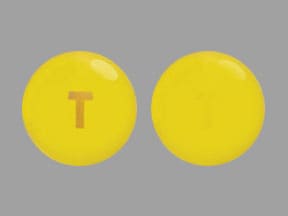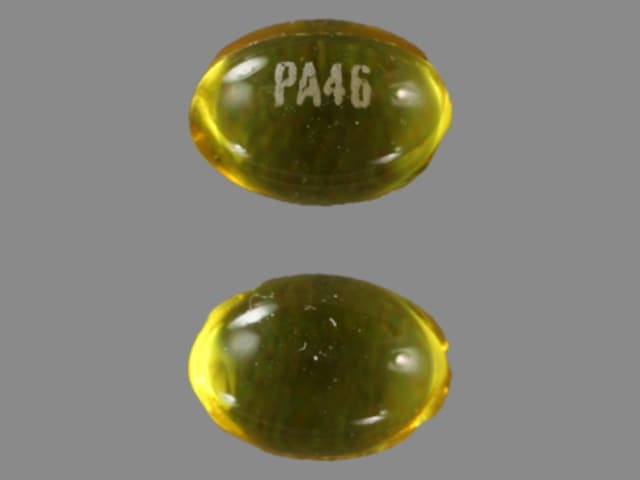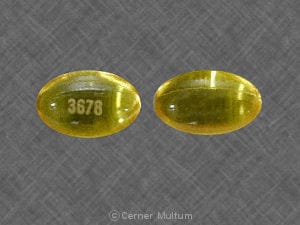Dosage Forms
Excipient information presented when available (limited, particularly for generics); consult specific product labeling.
Capsule, Oral:
Tessalon Perles: 100 mg
Generic: 100 mg, 150 mg, 200 mg
Pharmacology
Mechanism of Action
Tetracaine congener with antitussive properties; suppresses cough by topical anesthetic action on the respiratory stretch receptors
Pharmacokinetics/Pharmacodynamics
Onset of Action
Therapeutic: 15 to 20 minutes
Duration of Action
3 to 8 hours
Use: Labeled Indications
Cough: Symptomatic relief of cough
Contraindications
Hypersensitivity to benzonatate, related compounds, or any component of the formulation
Dosage and Administration
Dosing: Adult
Cough: Oral: 100 to 200 mg 3 times/day as needed for cough (maximum single dose: 200 mg; maximum dose: 600 mg/day)
Dosing: Geriatric
Refer to adult dosing.
Dosing: Pediatric
Cough: Children >10 years and Adolescents: Oral: 100 to 200 mg 3 times daily as needed for cough; maximum dose: 200 mg/dose; maximum daily dose: 600 mg/day
Administration
Oral: Swallow capsule whole (do not break, chew, dissolve, cut, or crush). If capsules are chewed or dissolved in the mouth, oral mucosa anesthesia may occur and could lead to choking. If numbness or tingling of the tongue, mouth, throat, or face occurs, refrain from oral ingestion of food or liquid until numbness has resolved.
Storage
Store at 25°C (77°F); excursions permitted between 15°C to 30°C (59°F to 86°F). Protect from light.
Benzonatate Images
Drug Interactions
There are no known significant interactions.
Adverse Reactions
Frequency not defined.
Cardiovascular: Chest numbness
Central nervous system: Chills, confusion, dizziness, hallucination, headache, sedation
Dermatologic: Pruritus, skin rash
Gastrointestinal: Constipation, gastrointestinal distress, nausea
Hypersensitivity: Hypersensitivity reaction (bronchospasm, laryngospasm, cardiovascular collapse)
Ophthalmic: Burning sensation of eyes
Respiratory: Nasal congestion
Warnings/Precautions
Concerns related to adverse effects:
- Hypersensitivity reactions: Severe hypersensitivity reactions, including bronchospasm, cardiovascular collapse and laryngospasm have been reported. May be related to localized anesthetic effects due to sucking or chewing the capsule instead of swallowing it.
- Psychiatric effects: Isolated cases of bizarre behavior, including mental confusion and visual hallucinations have been reported during concurrent use with other prescribed drugs.
Special populations:
- Pediatric: Accidental ingestion and potentially fatal overdose of benzonatate has been reported in children <10 years of age. Signs and symptoms of overdose (restlessness, tremors, convulsion, coma, cardiac arrest) may occur within 15 to 20 minutes and death has been reported within 1 hour of ingestion. Not approved for use in children <10 years of age.
Pregnancy
Pregnancy Risk Factor
C
Pregnancy Considerations
Animal reproduction studies have not been conducted. Information related to use in pregnancy is limited (Heinonen 1977).
Patient Education
What is this drug used for?
- It is used to relieve coughing.
Frequently reported side effects of this drug
- Constipation
- Dizziness
- Fatigue
- Stuffy nose
- Nausea
- Headache
Other side effects of this drug: Talk with your doctor right away if you have any of these signs of:
- Behavioral changes
- Confusion
- Sensing things that seem real but are not
- Numbness and tingling of mouth, throat, tongue, and face
- Signs of a significant reaction like wheezing; chest tightness; fever; itching; bad cough; blue skin color; seizures; or swelling of face, lips, tongue, or throat.
Note: This is not a comprehensive list of all side effects. Talk to your doctor if you have questions.
Consumer Information Use and Disclaimer: This information should not be used to decide whether or not to take this medicine or any other medicine. Only the healthcare provider has the knowledge and training to decide which medicines are right for a specific patient. This information does not endorse any medicine as safe, effective, or approved for treating any patient or health condition. This is only a brief summary of general information about this medicine. It does NOT include all information about the possible uses, directions, warnings, precautions, interactions, adverse effects, or risks that may apply to this medicine. This information is not specific medical advice and does not replace information you receive from the healthcare provider. You must talk with the healthcare provider for complete information about the risks and benefits of using this medicine.






